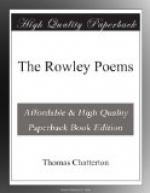his views expressed in an article written some few
days before his death. He believed in a daemon
or conscience which prompted every man to follow good
and avoid evil; but—different men different
daemons—his held self-slaughter justified
when life became intolerable; with him therefore it
would be no crime. Wilson suggests too that the
boy who had read theology, orthodox and the reverse,
held to the common eighteenth century view that death
was annihilation; and this may well have been the
case. One thing at any rate is certain, that
Chatterton on the 14th of April 1770 left on his desk
a number of pieces of paper filled with a jumble of
satiric verse, mocking prose, and directions for the
construction of a mediaeval tomb to cover the remains
of his father and himself. Part of this strange
document was headed in legal form—’This
is the last Will and Testament of me Thomas Chatterton,’
and contained the declaration that the Testator would
be dead on the evening of the following day—’being
the feast of the resurrection.’ The bundle
was dated and endorsed ’All this wrote between
11 and 2 o’clock Saturday in the utmost distress
of mind.’ Now while one need not doubt
that the distress was perfectly genuine, it is tolerably
certain that Chatterton intended his master to find
what he had written and draw his own conclusions as
to the desirability of dismissing his apprentice.
The attorney (who is represented as timid, irritable
and narrow-minded)[9] did in fact find the document,
was thoroughly frightened, and gave the boy his release.
He was now free to starve or earn a living by his
pen—so no doubt he represented the alternative
to his mother. He must go to London, where he
would certainly make his fortune. He had been
supplying four or five London journals of good standing
with free contributions for some time past, and had
received it appears great encouragement from their
editors. He gained his point and started out
for the great city.
His letters show that he called upon four editors
the very day he arrived. These were Edmunds of
the Middlesex Journal; Fell of the Freeholders
Magazine; Hamilton of the Town and Country Magazine;
and Dodsley—the same to whom he had sent
a portion of AElla—of the Annual
Register. He had received, he wrote, ’great
encouragement from them all’; ’all approved
of his design; he should soon be settled.’
Fell told him later that the great and notorious Wilkes
’affirmed that his writings could not be the
work of a youth and expressed a desire to know the
author.’ This may or may not have been
true, but it is certain that Fell was not the only
newspaper proprietor who was ready to exchange a little
cheap flattery for articles by Chatterton that would
never be paid for.[10]




